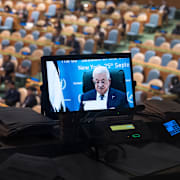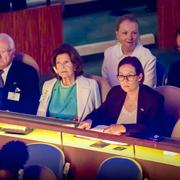bakgrund
Israeliska bosättningar och internationell lag
Wikipedia (en)
The international community considers the establishment of Israeli settlements in the Israeli-occupied territories illegal on one of two bases: that they are in violation of Article 49 of the Fourth Geneva Convention, or that they are in breach of international declarations. The United Nations Security Council, the United Nations General Assembly, the International Committee of the Red Cross, the International Court of Justice and the High Contracting Parties to the Convention have all affirmed that the Fourth Geneva Convention applies to the Israeli-occupied territories.Numerous UN resolutions and prevailing international opinion hold that Israeli settlements in the West Bank, East Jerusalem and the Golan Heights are a violation of international law, including UN Security Council resolutions in 1979, 1980, and 2016. UN Security Council Resolution 446 refers to the Fourth Geneva Convention as the applicable international legal instrument, and calls upon Israel to desist from transferring its own population into the territories or changing their demographic makeup. 126 Representatives at the reconvened Conference of the High Contracting Parties to the Geneva Conventions in 2014 declared the settlements illegal as has the primary judicial organ of the UN, the International Court of Justice and the International Committee of the Red Cross. United Nations Security Council Resolution 2334, which passed 14-0 with the United States abstaining, declared that Israel's settlement activity in the occupied Palestinian territories, including East Jerusalem, "has no legal validity and constitutes a flagrant violation under international law", and demanded that Israel "immediately and completely cease all settlement activities".Israel has consistently argued that the settlements are not in violation of the Fourth Geneva Convention since, in its view, Israeli citizens were neither deported nor transferred to the territories, and they cannot be considered to have become "occupied territory" since there had been no internationally recognized legal sovereign prior. Successive Israeli governments have argued that all authorized settlements are entirely legal and consistent with international law. In practice, Israel does not accept that the Fourth Geneva Convention applies de jure, but has stated that on humanitarian issues it will govern these areas de facto by its provisions, without specifying which these are. The majority of legal scholars hold the settlements to violate international law, while others have offered dissenting views supporting the Israeli position. The Israeli Supreme Court itself has never addressed the issue of the settlements' legality.The establishment of settlements has been described by some legal experts as a war crime according to the Rome Statute, and is currently under investigation as part of the International Criminal Court investigation in Palestine.




